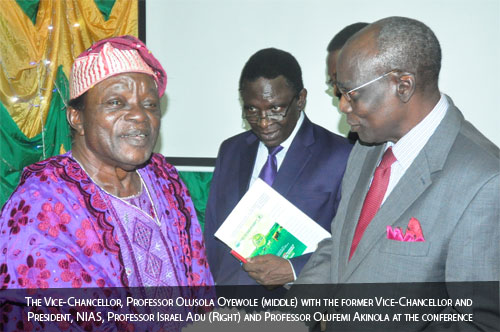
The Vice-Chancellor, Professor Olusola Oyewole, has charged the Society for Grassland Research and Development in Nigeria (SOGREDEN), to play a vital role in resolving the rustling activities that are causing disaffection among traditional herdsmen and indigenous crop farmers in the country. He made the call during the maiden biennial conference of the Society, tagged “Towards a Sustainable Utilisation of Forage and Grassland Resources for Improved Livestock Production in Nigeria”.
The Vice-Chancellor urged members of the Society to come up with modalities that would make government policies adequate to resolve the re-occurring clashes between herdsmen and indigenous crop farmers that led to loss of lives and wanton destruction of properties. Professor Oyewole, who is also the President, Association of African Universities (AAU), therefore, appealed to federal and state governments, as well as members of the Society to support cutting edge research in a bid to putting an end to the problem. He also declared that SOGREDEN had a great role to play in the provision and management of forage resources for the large population of livestock in Nigeria. Professor Oyewole stated that FUNAAB has 10 Colleges and 42 Departments offering undergraduate and postgraduate programmes, noting that FUNAAB was the only University to have a full-fledged and accredited Department of Pasture and Range Management, under the College of Animal Science and Livestock Production (COLANIM).
The President of SOGREDEN, Professor Olufemi Onifade, revealed that the Society was incorporated in November 2010, following the stakeholders’ meeting held in FUNAAB in 2008. Professor Onifade, who was the immediate past Director, Centre for Entrepreneurial Studies (CENTS) of the University, reiterated the need for the training of technical officers, as most staff with relevant training in Pasture and Range Management in government ministries, had retired. Professor Onifade decried the status of the natural grassland resources, which was rapidly declining due to man’s intervention and the adverse effects of climate change, adding that the Society needed to plan ahead for the production of pasture seeds and establish the era in which farmers purchased animals without adequate provision of feed, most especially for the dry season, was long gone.

The President, Nigerian Institute of Animal Science (NIAS), Professor Israel Adu, recalled that the establishment of NIAS by an Act of the Nigerian Parliament, No. 26 of 2007, was amended in April 2015 and saddled with the powers to regulate all matters relating to Animal Husbandry in Nigeria. Professor Adu, a former Vice-Chancellor of the University, stated that Nigeria had about 40 million hectares of grazeable land out of the 93 million hectares of country’s land area, adding that the available grazeable area was under pressure due to the increased number of available livestock, improved health services, land use patterns, effects of climate change, among others. He, therefore, commended the incumbent Vice-Chancellor for the tremendous growth witnessed in the University, praying that God should give him the grace to carry the burden of office. He disclosed that when he was Vice-Chancellor, the burden seemed lighter in terms of student and staff numbers. But today, the number had increased astronomically, meaning that the responsibilities would be more, he added.
